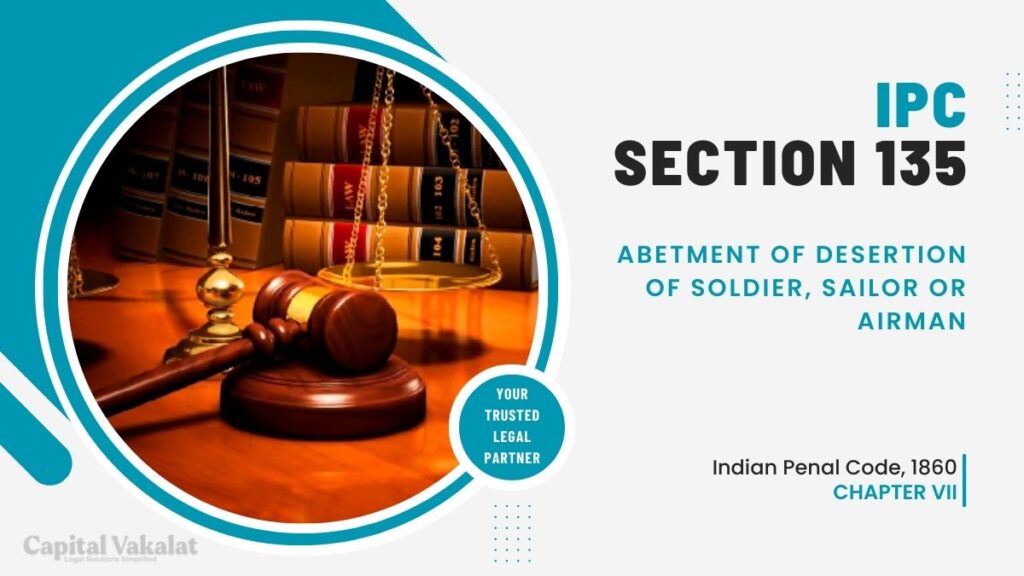Soldiers, sailors, and airmen play a crucial role in defending a nation’s sovereignty and security. Their unwavering commitment and dedication are vital to maintaining the peace and order of a nation. To ensure that these individuals fulfill their duties without hindrance, the legal system provides protection against acts that may lead to their desertion.

In this article, we will explore Section 135 of the Indian Penal Code (IPC), which deals with the abetment of desertion of a soldier, sailor, or airman.
Introduction to Section 135 IPC
Section 135 of the IPC is a legal provision that specifically addresses the act of abetting the desertion of soldiers, sailors, or airmen. Abetment, in legal terms, refers to instigating, engaging in a conspiracy, or aiding another person to commit a criminal offense. In the context of Section 135 IPC, it pertains to encouraging or facilitating the act of desertion by a member of the armed forces.
Understanding Abetment in Legal Terms
To comprehend the gravity of abetment, it is essential to understand the legal definition. Abetment involves intentionally assisting someone in the commission of an offense. The person providing such assistance is equally culpable as the person committing the crime. Abetment is often seen as a deliberate act to promote, instigate, or facilitate the commission of a criminal act.
Desertion of Soldier, Sailor, or Airman: A Serious Offense
Desertion from military service is a grave offense. It compromises national security and the discipline necessary for the effective functioning of the armed forces. Abetting desertion adds another layer of criminality, making it crucial to examine this subject in detail.
Elements of Abetment of Desertion
For an offense to be constituted under Section 135 IPC, certain elements must be present. These include:
a. Instigation
b. Conspiracy
c. Assistance
d. Intention
The accused must have played a role in instigating the soldier, sailor, or airman to desert, engaged in a conspiracy to encourage desertion, or provided assistance to facilitate the act. Importantly, they must have had the intention to commit the act.
Legal Consequences of Abetment under Section 135 IPC
If found guilty of abetment under Section 135 IPC, the accused may face legal consequences, including imprisonment. The severity of the punishment depends on various factors, such as the degree of assistance provided and the impact on national security.
Notable Cases Involving Abetment of Desertion
Throughout legal history, several notable cases have revolved around abetment of desertion. These cases often highlight the complexities involved in proving abetment charges and the nuances of intent.
Challenges in Proving Abetment
Proving abetment in court can be challenging. It necessitates a thorough investigation to establish the connection between the accused’s actions and the act of desertion. It’s important to show that the accused had a direct role in instigating or assisting the soldier, sailor, or airman.
The Burden of Proof in Section 135 IPC Cases
The burden of proof rests with the prosecution in Section 135 IPC cases. They must demonstrate beyond a reasonable doubt that the accused indeed abetted the desertion.
Defenses Against Abetment Charges
Defendants may have various defenses against abetment charges, including lack of intent, absence of direct assistance, or the absence of a conspiracy. Each case requires a detailed evaluation of the specific circumstances.
Implications of a Conviction
A conviction under Section 135 IPC can have far-reaching implications for the accused, affecting their personal and professional life. It is crucial for individuals facing such charges to seek legal counsel to protect their rights and interests.
The Role of Intent in Abetment
Proving intent is a pivotal aspect in abetment cases. The prosecution must establish that the accused had the requisite intent to abet the desertion.
Abetment of Desertion vs. Other Offenses
It is important to differentiate abetment of desertion from other offenses related to the armed forces, as the legal consequences and elements of each offense may vary.
Importance of Legal Representation
Individuals accused of abetment under Section 135 IPC should seek legal representation to ensure a fair trial and protect their rights. Experienced legal counsel can navigate the complexities of such cases.
Recent Developments in Section 135 IPC Cases
The legal landscape is continually evolving, and recent developments in Section 135 IPC cases may impact how these cases are prosecuted and defended.
Conclusion
In conclusion, Section 135 IPC addresses the serious offense of abetment of desertion of a soldier, sailor, or airman. Understanding the legal aspects, elements, and implications of such abetment is essential, both for the accused and the legal system. It is vital to emphasize the importance of seeking legal counsel when facing such charges to ensure a fair and just trial.
FAQs
How can one defend against abetment charges in such cases?
Defending against abetment charges often involves establishing the lack of intent, absence of direct assistance, or the absence of a conspiracy. A strong legal defense is crucial.
Are there any recent amendments to Section 135 IPC?
As of my last knowledge update in September 2021, there were no recent amendments to Section 135 IPC. It’s essential to consult the latest legal resources for any updates.
What role does intent play in abetment cases?
Intent plays a pivotal role in abetment cases. The prosecution must prove that the accused had the requisite intent to abet the desertion of the soldier, sailor, or airman.
Can a soldier, sailor, or airman be charged with desertion without abetment?
Yes, a soldier, sailor, or airman can be charged with desertion without abetment. Desertion charges may be filed independently if the individual leaves their military service without proper authorization.